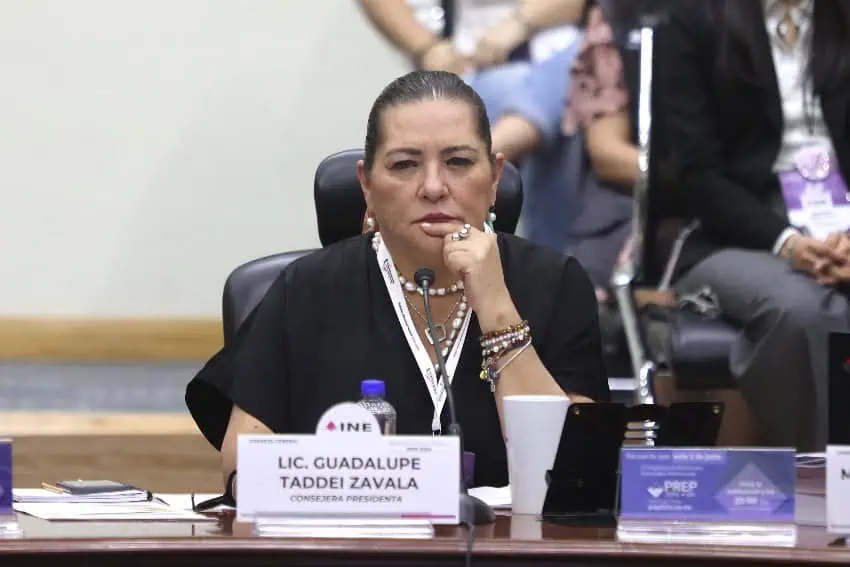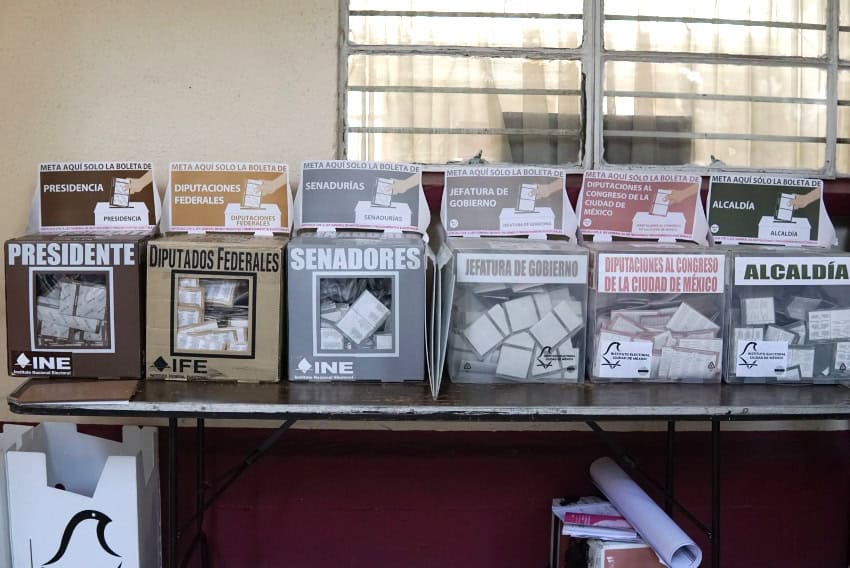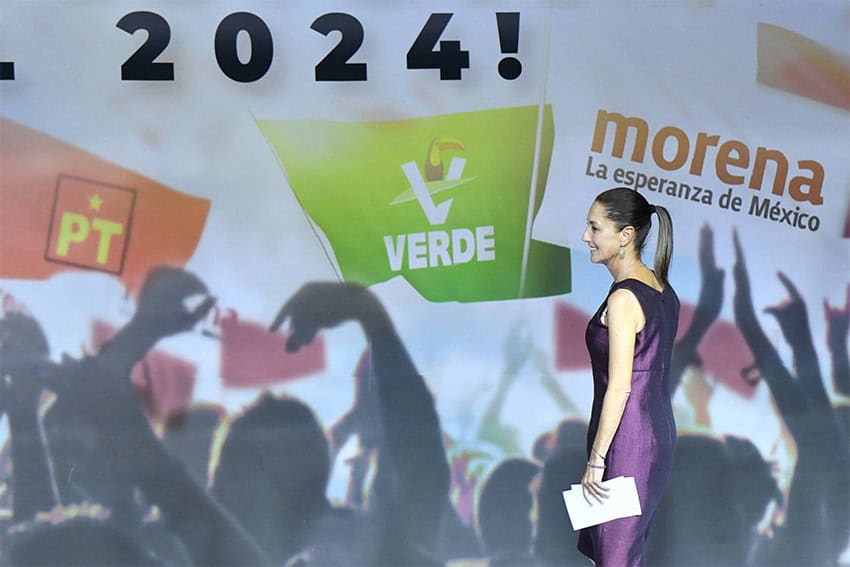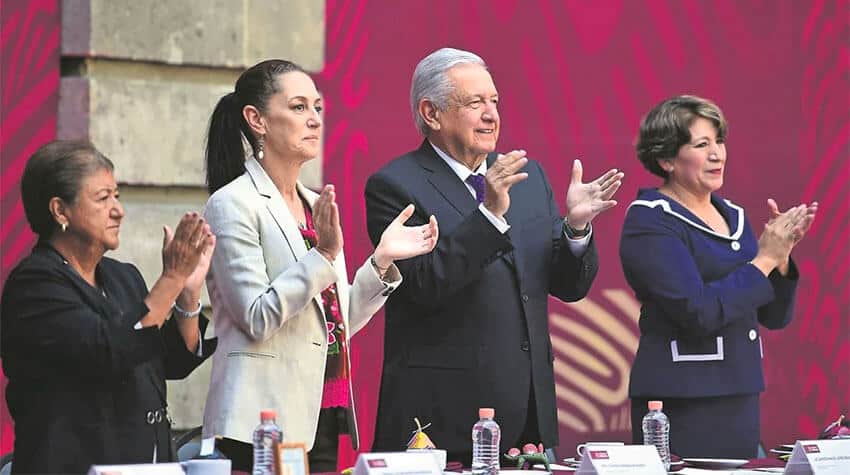The ruling Morena party and its allies won a highly-coveted two-thirds majority in the lower house of Congress in Mexico’s elections on Sunday. It could also reach a supermajority in the Senate, according to preliminary results.
The president of the National Electoral Institute (INE), Guadalupe Taddei, announced “quick count” results for the Chamber of Deputies and the Senate late Sunday.

For each party, the INE calculated a range for the number of seats they could win in each house of Congress. The ranges are based on the percentage of votes each party received.
Morena and its allies, the Labor Party (PT) and the Ecological Green Party of Mexico (PVEM), will easily win more than 300 seats in the 500-seat Chamber of Deputies, according to the quick count. The wins will give them a supermajority in the lower house of Congress.
If the three parties win the upper end of their predicted range of Senate seats, they will also achieve a two-thirds majority in the upper house. Final results for the congressional elections are due later this week.
Morena and its allies currently have a simple majority in both houses of Congress.

A supermajority in both houses would allow the coalition led by Morena to approve constitutional reform proposals without the support of opposition parties. That would give immense power to president-elect Claudia Sheinbaum, who won the presidential election in a landslide.
She has expressed support for a package of constitutional reform proposals President Andrés Manuel López Obrador (AMLO) submitted to Congress earlier this year.
More on those proposals — and what a Morena supermajority would mean for the current president and his successor — later.
The Chamber of Deputies
The INE quick count results show that Morena, the PT and the PVEM will win between 346 and 380 seats in the Chamber of Deputies. Such a result would give the alliance an unexpected supermajority.
Lawmakers are elected to the lower house both directly and according to a proportional representation system.
The breakdown of the predicted 346-380 seat range is as follows:
- Morena is expected to win between 41.2% and 42.8% of the vote, giving the party a total of 233-251 seats in the Chamber of Deputies.
- PT is expected to win between 5.3% and 6.1% of the vote, giving the party a total of 46-52 seats.
- PVEM is expected to win between 8.1% and 9.1% of the vote, giving the party a total of 67-77 seats.
The three-party opposition alliance made up of the National Action Party (PAN), the Institutional Revolutionary Party (PRI) and the Democratic Revolution Party (PRD) will win between 94 and 129 seats in the Chamber of Deputies, according to the quick count.
The breakdown of that range is as follows:
- PAN could win between 17.3% and 18.7% of the vote, giving the party a total of 64-80 seats in the Chamber of Deputies.
- PRI could win between 11.1% and 11.9% of the vote, giving the party a total of 30-41 seats.
- PRD could win between 2.4% and 3.1% of the vote, giving the party a total of 0-8 seats.
Citizens Movement (MC) is expected to win between 11.1% and 12% of the vote, giving the party a total of 23-32 seats.
Independent candidates are expected to win between 0% and 0.9% of the vote. Such candidates could fail to win any seats in the lower house, or they could get a maximum of two, according to the INE quick count.

The Senate
The quick count results show that Morena, the PT and the PVEM will win between 76 and 88 seats in the Senate. To reach a two-thirds majority, they will need to win a minimum of 86 seats. As is the case with the lower house, Senate seats are allocated directly and according to a proportional representation system.
The breakdown of the predicted 76-88 seat range is as follows:
- Morena could win between 41.9% and 44% of the vote, giving the party a total of 57-60 seats in the Senate.
- PT could win between 5.3% and 6.5% of the vote, giving the party a total of 9-13 seats.
- PVEM could win between 8.6% and 9.8% of the vote, giving the party a total of 10-15 seats.
The PAN-PRI-PRD alliance is likely to win between 34 and 43 seats in the Senate.
The breakdown of that range is as follows:
- PAN could win between 15.8% and 17.9% of the vote, giving the party a total of 19-22 seats in the Senate.
- PRI could win between 10.7% and 12.3% of the vote, giving the party a total of 15-18 seats.
- PRD could win between 2 and 2.7% of the vote, giving the party a total of 0-3 seats.
MC could win between 10.9% and 12% of the vote, giving the party a total of 4-8 Senate seats.
What would a Morena supermajority in Congress mean for the current and future president?

If Morena and its allies end up securing a two-thirds majority in both the Chamber of Deputies and the Mexican Senate, López Obrador will have a one-month window of opportunity to push constitutional changes through Congress. That is because the lawmakers elected on Sunday will assume their positions on Sept. 1 and the president will leave office on Oct. 1.
AMLO, as noted earlier, submitted a package of constitutional reform proposals to Congress in February. Among his proposals are ones to:
- Guarantee that annual minimum salary increases outpace inflation.
- Overhaul the pension system so that retired workers receive pensions equivalent to 100% of their final salaries.
- Allow citizens to directly elect Supreme Court justices and other judges.
- Eliminate numerous autonomous government agencies.
- Reduce the number of federal lawmakers and the amount of money spent on elections and funding political parties.
- Incorporate the National Guard into the military.
- Ban fracking and genetically modified corn — the latter of which is a source of conflict with the United States.

Opposition parties vehemently oppose many of López Obrador’s proposals, especially ones they regard as attacks on Mexico’s democratic system and institutions.
There is also significant opposition to his plan to reincorporate the National Guard into the military. AMLO put the security force under the control of the Defense Ministry in 2022, but the Supreme Court ruled last year that that move was unconstitutional.
Even if Morena and its allies win a two-thirds majority in both the lower and upper houses of Mexico’s Congress, it is unlikely that López Obrador would be able to get all 20 of his constitutional reform proposals approved in the space of a single month.
That’s where Sheinbaum comes in.
She backs the president’s proposals and campaigned on her commitment to build on AMLO’s so-called “fourth transformation.” If Morena’s coalition has a supermajority in both houses of Congress, there will be ample time to pass the proposals.
Some analysts believe López Obrador sent the constitutional proposals to Congress in order to set the agenda for his successor. However, AMLO asserted on Monday that he didn’t want to “impose anything” on his successor.

“We have to come to an agreement to look at these [reform] initiatives with Claudia and other things,” he said.
A Morena supermajority in both houses would give enormous power to Sheinbaum, who will become Mexico’s first ever female president on Oct. 1.
Given her comprehensive victory over opposition bloc candidate Xóchitl Gálvez, she could rightfully argue that she has a strong mandate to make the constitutional changes proposed by López Obrador, as well as other reforms she puts forward herself.
Mexico News Daily

